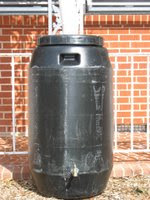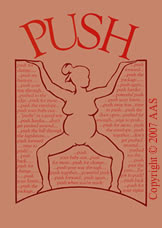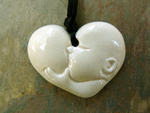A reader posted this in response to my post about "Colic, baby talk, attachment and all that ..."
Did you see what happened to the family who was kicked off a plane b/c their 3 year old refused to sit down and had a temper tantrum? While I agree that by 3 a child should probably be able to control his/herself a little more (but not much!)...it's the response of the American public that is so disgusting. There are over 200 comments on an MSN blog stating basically the same thing---children should be seen and not heard...some even wrote that children/babies should not be allowed on planes because they cry/fuss sometimes...DISGUSTING!!! I think we should ban the annoying adults who do much worse than try to communicate their feelings the way children/babies on planes do. Okay...enough ranting from me!
I want to reiterate an important point about babies and children from my earlier, loooooong post. Where ever babies they are --- they are vulnerable, open, receptive vessels AND children act out what adults don't deal with. Whatever is happening -- for the adult -- is magnified for the baby, plus the baby will not have the means to communicate it. Well, they do, let me adjust that. Babies don't get heard, acknowledged, respected, and supported when they communicate loudly and desperately. The get shhushed and silenced, sometimes rudely and violently. Babies are non-verbal communicators, except for their crying. Just because they can't talk yet, doesn't mean the brain isn't learning language, and isn't putting thought, experience, and words together. What we say and do gets soaked up. It creates the experiences that wire their brain/computers to function.
Babies EXPERIENCE the world and everything in their environment. They soak it up like a dry sponge. Babies are sensory beings with multiple senses. They SENSE the world, especially in the first months. They hear, see, smell, feel the world around them and that is how they learn. By absorption. They are magnets for what is happening around them and take in everything only to reveal it in amazing ways. What parent doesn't know that on some level? That you can be somewhere, see someone, say something and later the baby obviously remembers it. My daughter met her paternal grandparents at age four months and did not see them again until she was eighteen months old. She saw them in photographs I showed her frequently. Eighteen month old and at O'hare airport at the international gate flooding with people, SHE found their faces in the crowd BEFORE me and reached out for them. Then, I saw them. Later, when she was five she, her twenty-five year old brother, and I re-visited a restaurant where she showed him the table and where every member of the family had sat at this same restaurant over a year before. He looked at me in surprise, and I just said, more like a warning, "Everything you say and do is being recorded at all times." It begins at birth.
The human infant is the purest we'll be in life. We are taught to deny and disassociate from the first moments of life. "Shhhh. Shhh.. you are ok." (Your pain is not real). Most adults can still walk into a room and feel the emotional climate. It's called "energy" and we feel the collective attitude of a room because we are energy beings. (Quantum physics again). Babies are super-charged, one might say. A baby does not yet know how to negotiate the big, loud, bright, toxic world. When you see a small baby in a loud place -- store or football, or family gathering, s/he LOOKS like she is sleeping. Who hasn't heard someone marvel at the baby sleeps through it. Babies aren't sleeping -- they are "checked out", "zoned out", also known as disassociating. Amazing, eh? how early the human learns to disassociate?
So, are the biggest fears of most adults? Public speaking, flying, and death. What do people do -- besides drugs -- to be able to fly? Disassociate. Are they still afraid?!? YES!! What happens to that panicked, frenzied energy? It is absorbed by those less able to avoid, deny, and disassociate. Babies and children. The newborn and infant must be able to shut out stresses in his new environment -- if he not, he is going to be crying about it.
So, why would a young child of three NOT become upset, especially if she has flown before and has THAT experience and memory (of pain in her ears, fear, and parental stress) and she is surrounded by maybe hundreds of stressed out adults, many of whom are also panicked and afraid they're gonna die? Why wouldn't we have the greatest compassion for the smallest among us?
Reminds me of a story, of course. Ten years ago when I lived in Phoenix I flew frequently to Kansas City on Southwest. I got to get on first with my under two daughter and pick a seat. As the plane filled up NO ONE wanted to sit by us. In fact, seats around us were last to fill. It was great. There was always an extra seat and they allowed me to put my car seat on for here with the understanding if they needed the seat they would stow the car seat. Aaah, the good, ole days. I loved Southwest -- it's run by a woman, you know!
What would the world look like if children really and truly were "our greatest resource" as is given "lip service?"
The Other Side of the Glass
Part One was officially released June 2013 in digital distribution format.
To purchase to to www.theothersideoftheglass.com
If you were a donor and want to download your copy send an email to theothersideoftheglassfilm@gmail.com.
The trailer
Saturday, January 27, 2007
Subscribe to:
Post Comments (Atom)
"Soft is the heart of a child. Do not harden it."
A public awareness reminder that things that happen behind the scenes, out of our sight, aren't always as rosy as we might think them to be. Perhaps its a restaurant cook who accidentally drops your burger
on the floor before placing it on the bun and serving it to you. Here it's an overworked apathetic (pathetic) nurse giving my newborn daughter her first bath.
Please comment and rate this video, so as to insure that it is viewed as widely as possible, perhaps to prevent other such abuse. -- The mother who posted this YouTube. How NOT to wash a baby on YouTube
Are you going to try to tell me that "babies don't remember?" There is no difference to this baby's experience and the imprinting of her nervous system/brain and one that is held and cleaned by the mother or father either at the hospital or at home?
By the way, this is probably NOT the baby's first bath. The nurse is ungloved. Medical staff protocol is that they can't handle a baby ungloved until is has been bathed (scrubbed if you've seen it) because the baby is a BIO-HAZARD -- for them. Never mind that the bio-hazard IS the baby's first line of defense against hospital germs.
Missouri Senator Louden Speaks
Finally, A Birth Film for Fathers
Part One of the "The Other Side of the Glass: Finally, A Birth Film for and about Men" was released June, 2013.
Through presentation of the current research and stories of fathers, the routine use of interventions are questioned. How we protect and support the physiological need of the human newborn attachment sequence is the foundation for creating safe birth wherever birth happens.
Based on knowing that babies are sentient beings and the experience of birth is remembered in the body, mind, and soul, fathers are asked to research for themselves what is best for their partner and baby and to prepare to protect their baby.
The film is designed for midwives, doulas, and couples, particularly fathers to work with their caregivers. Doctors and nurses in the medical environment are asked to "be kind" to the laboring, birthing baby, and newborn. They are called to be accountable for doing what science has been so clear about for decades. The mother-baby relationship is core for life. Doctors and nurses and hospital caregivers and administrators are asked to create protocols that protect the mother-baby relationship.
Men are asked to join together to address the vagaries of the medical system that harm their partner, baby and self in the process of the most defining moments of their lives. Men are asked to begin to challenge the system BEFORE they even conceive babies as there is no way to be assured of being able to protect his loved ones once they are in the medical machine, the war zone, on the conveyor belt -- some of the ways that men describe their journey into fatherhood in the medicine culture.
Donors can email theothersideoftheglassfilm@gmail.com to get a digital copy.
Through presentation of the current research and stories of fathers, the routine use of interventions are questioned. How we protect and support the physiological need of the human newborn attachment sequence is the foundation for creating safe birth wherever birth happens.
Based on knowing that babies are sentient beings and the experience of birth is remembered in the body, mind, and soul, fathers are asked to research for themselves what is best for their partner and baby and to prepare to protect their baby.
The film is designed for midwives, doulas, and couples, particularly fathers to work with their caregivers. Doctors and nurses in the medical environment are asked to "be kind" to the laboring, birthing baby, and newborn. They are called to be accountable for doing what science has been so clear about for decades. The mother-baby relationship is core for life. Doctors and nurses and hospital caregivers and administrators are asked to create protocols that protect the mother-baby relationship.
Men are asked to join together to address the vagaries of the medical system that harm their partner, baby and self in the process of the most defining moments of their lives. Men are asked to begin to challenge the system BEFORE they even conceive babies as there is no way to be assured of being able to protect his loved ones once they are in the medical machine, the war zone, on the conveyor belt -- some of the ways that men describe their journey into fatherhood in the medicine culture.
Donors can email theothersideoftheglassfilm@gmail.com to get a digital copy.
Buy the film at www.theothersideoftheglass.com.
The film focuses on the male baby, his journey from the womb to the world and reveals healing and integrating the mother, father, and baby's wounded birth experience. The film is about the restoring of our families, society, and world through birthing loved, protected, and nurtured males (and females, of course). It's about empowering males to support the females to birth humanity safely, lovingly, and consciously.
Finally, a birth film for fathers.
The film focuses on the male baby, his journey from the womb to the world and reveals healing and integrating the mother, father, and baby's wounded birth experience. The film is about the restoring of our families, society, and world through birthing loved, protected, and nurtured males (and females, of course). It's about empowering males to support the females to birth humanity safely, lovingly, and consciously.
Finally, a birth film for fathers.
What People Are Saying About the FIlm
Well, I finally had a chance to check out the trailer and .. wow! It's nice that they're acknowledging the father has more than just cursory rights (of course mom's rights are rarely acknowledged either) and it's great that they're bringing out the impact of the experience on the newborn, but I'm really impressed that they're not shying away from the political side.
They are rightly calling what happens in every American maternity unit, every day, by its rightful name - abuse. Abuse of the newborn, abuse of the parents and their rights, abuse of the supposedly sacrosanct ethical principal of patient autonomy and the medico-legal doctrine of informed consent, which has been long ago discarded in all but name. I love it!
In the immortal words of the "shrub", "bring it on!" This film needs to be shown and if I can help facilitate or promote it, let me know.
Father in Asheville, NC
Thanks for sharing this. It was very touching to me. I thought of my brother-in-law standing on the other side of the glass when my sister had to have a C-section with her first child because the doctor was missing his golf date. I'll never forget his pacing back and forth and my realizing that he was already a father, even though he hadn't been allowed to be with his son yet.
Margaret, Columbia, MO
They are rightly calling what happens in every American maternity unit, every day, by its rightful name - abuse. Abuse of the newborn, abuse of the parents and their rights, abuse of the supposedly sacrosanct ethical principal of patient autonomy and the medico-legal doctrine of informed consent, which has been long ago discarded in all but name. I love it!
In the immortal words of the "shrub", "bring it on!" This film needs to be shown and if I can help facilitate or promote it, let me know.
Father in Asheville, NC
OMG'ess, I just saw the trailer and am in tears. This is so needed. I watch over and over and over as fathers get swallowed in the fear of hospitals birth practice. I need a tool like this to help fathers see how very vital it is for them to protect their partner and baby. I am torn apart every time I see a father stand back and chew his knuckle while his wife is essentially assaulted or his baby is left to lie there screaming.
Please send me more info!!!!
Carrie Hankins
CD(DONA), CCCE, Aspiring Midwife
720-936-3609
Thanks for sharing this. It was very touching to me. I thought of my brother-in-law standing on the other side of the glass when my sister had to have a C-section with her first child because the doctor was missing his golf date. I'll never forget his pacing back and forth and my realizing that he was already a father, even though he hadn't been allowed to be with his son yet.
Margaret, Columbia, MO
In case you don't find me here
Soon, I'll be back to heavy-duty editing and it will be quiet here again. I keep thinking this blog is winding down, and then it revives. It is so important to me.
I wish I'd kept a blog of my journey with this film this past 10 months. It's been amazing.
I have a new blog address for the film, and will keep a journal of simple reporting of the journey for the rest of the film.
www.theothersideoftheglassthefilm.blogspot.com
I'll be heading east this week to meet with a group of men. I plan to post pictures and clips on the film blog.
I'll keep up here when I can -- when I learn something juicy, outrageous, or inspiring related to making birth safer for the birthing baby.
I wish I'd kept a blog of my journey with this film this past 10 months. It's been amazing.
I have a new blog address for the film, and will keep a journal of simple reporting of the journey for the rest of the film.
www.theothersideoftheglassthefilm.blogspot.com
I'll be heading east this week to meet with a group of men. I plan to post pictures and clips on the film blog.
I'll keep up here when I can -- when I learn something juicy, outrageous, or inspiring related to making birth safer for the birthing baby.
Review of the film
Most of us were born surrounded by people who had no clue about how aware and feeling we were. This trailer triggers a lot of emotions for people if they have not considered the baby's needs and were not considered as a baby. Most of us born in the US were not. The final film will include detailed and profound information about the science-based, cutting-edge therapies for healing birth trauma.
The full film will have the interviews of a wider spectrum of professionals and fathers, and will include a third birth, at home, where the caregivers do a necessary intervention, suctioning, while being conscious of the baby.
The final version will feature OBs, RNs, CNMs, LM, CPM, Doulas, childbirth educators, pre and perinatal psychologists and trauma healing therapists, physiologists, neurologists, speech therapists and lots and lots of fathers -- will hopefully be done in early 2009.
The final version will include the science needed to advocated for delayed cord clamping, and the science that shows when a baby needs to be suctioned and addresses other interventions. Experts in conscious parenting will teach how to be present with a sentient newborn in a conscious, gentle way -- especially when administering life-saving techniques.
The goal is to keep the baby in the mother's arms so that the baby gets all of his or her placental blood and to avoid unnecessary, violating, and abusive touch and interactions. When we do that, whether at home or hospital, with doctor or midwife, the birth is safe for the father. The "trick" for birthing men and women is how to make it happen in the hospital.
The full film will have the interviews of a wider spectrum of professionals and fathers, and will include a third birth, at home, where the caregivers do a necessary intervention, suctioning, while being conscious of the baby.
The final version will feature OBs, RNs, CNMs, LM, CPM, Doulas, childbirth educators, pre and perinatal psychologists and trauma healing therapists, physiologists, neurologists, speech therapists and lots and lots of fathers -- will hopefully be done in early 2009.
The final version will include the science needed to advocated for delayed cord clamping, and the science that shows when a baby needs to be suctioned and addresses other interventions. Experts in conscious parenting will teach how to be present with a sentient newborn in a conscious, gentle way -- especially when administering life-saving techniques.
The goal is to keep the baby in the mother's arms so that the baby gets all of his or her placental blood and to avoid unnecessary, violating, and abusive touch and interactions. When we do that, whether at home or hospital, with doctor or midwife, the birth is safe for the father. The "trick" for birthing men and women is how to make it happen in the hospital.








1 comment:
It would be interesting to know whether the three year old in question was on the autism spectrum. I know some say it's too young to tell, but my 3yo has a diagnosis, and my 2yo is about to be diagnosed and if they're tantruming, nothing can calm them down unless the source of the problem is identified and sorted out. I did a 27 hour flight with the two of them and was very, very lucky that they were as relatively well behaved as they were. Fortunately all the flight staff were wonderful (except the people at LAX) and patient, but even so, it was very, very hard keeping the seatbelt on my 3yo as we were coming into land. I had the sum total of 2 hours sleep throughout the flight, but people were nothing but sympathetic. If we were to do the same flight now and there's a precedent for a tantrum being enough to get you thrown off, then that's us stuck in this country, whether we like it or not.
Post a Comment